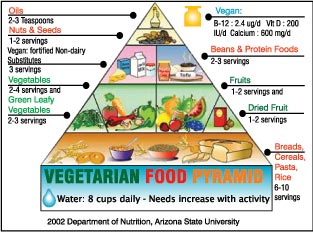
Veggie way to good health"I've been a vegetarian now for over a year," says 33-year-old Anusha De Mel adding that the positive changes in her health and lifestyle have been amazing. Weight loss, a lowering of her previously high cholesterol levels and a positive effect on her blood pressure are among the benefits she has reaped the past year. Does she miss eating meat? "Not at all," she says. In fact, after the first few weeks of a vegetarian diet, the very thought of eating meat would nauseate her.
Many people nowadays are turning vegetarian for a variety of reasons: religious and spiritual beliefs, compassion for animals, concern for the environment and personal health. No longer is meat considered an essential part of a healthy diet, and there is growing evidence to show that vegetarians enjoy better health and live longer than their meat-eating counterparts. Vegetarianism is becoming increasingly popular among all segments of society, says Inoka Jayasiri, Dietitian at Asiri Surgical Hospital. A vegetarian diet can be a healthy option, she explains, but it is important to ensure that it is well balanced. Who is a vegetarian? Although we may think of vegetarians simply as those who don't eat meat, there are actually different categories of vegetarians. A vegan is one who avoids all animal products - fish, red meat, poultry, eggs and dairy products. Fruitarians eat only fruits, nuts, honey and vegetable oils. A lacto-ovo-vegetarian eats no fish, red meat or poultry but does consume both dairy products and eggs along with plants. Lacto-ovo-vegetarians are probably the majority group amongst vegetarians. A lacto-vegetarian has the same diet as a lacto-ovo-vegetarian, but will not eat eggs. Semi-vegetarians avoid only red meat but usually eat fish, poultry, dairy food, eggs, and plants. What are the health benefits of being vegetarian?
A vegetarian diet tends to be lower in saturated fat and higher in starchy carbohydrates and dietary fibre than an omnivorous diet. This results in a number of positive health benefits, says Ms. Jayasiri. Vegetarians have a significantly lower risk of developing:
How do vegetarians get balanced nutrition? Becoming vegetarian does not mean simply eliminating meat from the diet. They must also ensure that essential nutrients found in animal food are adequately replaced, stresses Ms. Jayasiri, adding that there is nothing very unusual about the vegetarian diet. It simply consists of a balance of fruits, vegetables, grains and legumes. As in any healthy diet, vegetarians must choose a wide variety of foods, because no single food provides all of the nutrients that your body needs. It is important for vegetarians to pay attention to these categories in particular: Protein - Vegetarians who eat eggs or dairy products have convenient sources of protein. Other sources include: soy products, legumes, whole grains, nuts and seeds. Vitamin B-12 - This is found mainly in animal sources. Vegetarians who consume dairy products and/or eggs usually get enough B-12. Vegans, however, should have vitamin B-12 fortified soy milk or cereals, fortified soy products or take vitamin B-12 supplements. Iron - Many plant foods are high in iron such as whole grains, dried fruits, dried beans and peas, lentils, seeds and dark green vegetables. To help your body absorb non-animal sources of iron, eat foods rich in vitamin C such as citrus fruits, guava, or juices at the same time you consume iron containing foods. Calcium - Vegetarians can meet their calcium needs if they consume sufficient amounts of dairy products such as milk, yoghurt, and cheese. Calcium is also found in many plant foods including green leaves, legumes and nuts. Vegans should take calcium fortified soy milk or juices and calcium supplements. Zinc - Whole grains, nuts and legumes are good sources of Zinc. Is a vegetarian diet safe for children? Extra care must be taken to ensure that all nutrients needed for healthy growth are included in children’s diet. For this, meals should contain a wide variety of foods. For vegetarian infants and children, small, frequent, energy-dense meals are preferable. Low fat, high fibre diets are not appropriate for children under 2 years. More fibre means that satiety levels are reached quickly and less food is eaten. While this may contribute to maintaining a healthy weight in adults, it may mean insufficient weight gain in children. The key to a successful healthy vegetarian diet is variety and adequate meal planning, says Ms. Jayasiri, pointing out that although it may take some lifestyle adjustments to go from meat-eater to vegetarian, all in all, the health benefits may be worth it. |
|| Front
Page | News | Editorial | Columns | Sports | Plus | Financial
Times | International | Mirror | TV
Times | Funday
Times | Medi Scene || |
| |
Copyright
2007 Wijeya
Newspapers Ltd.Colombo. Sri Lanka. |



